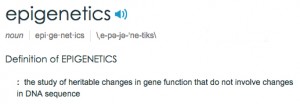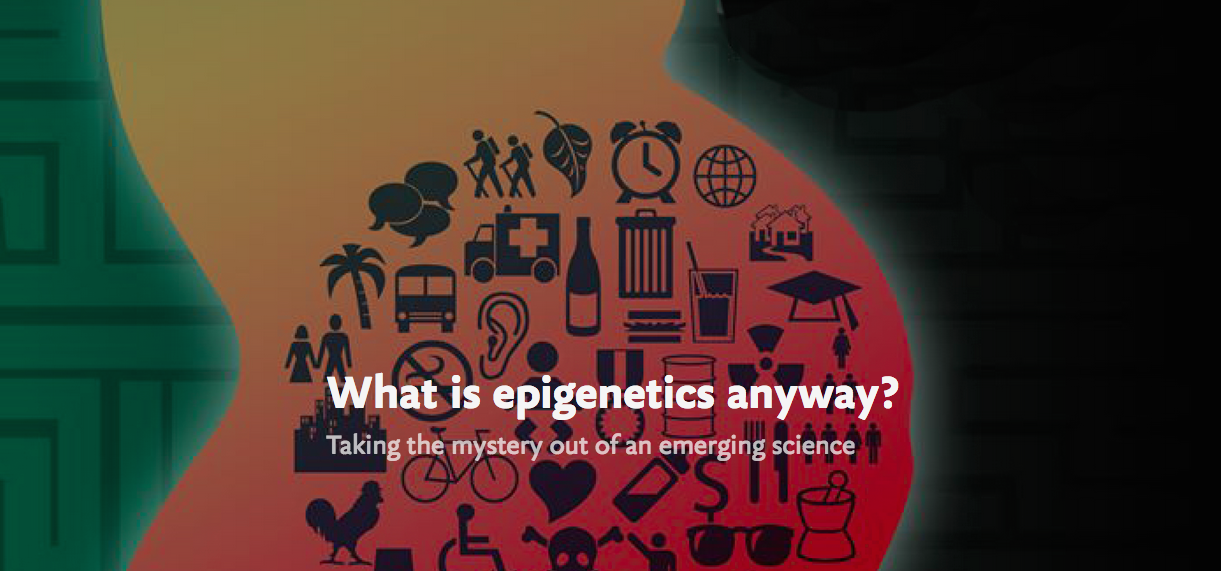To introduce our 11th Annual Life Sciences and Society Program, The Epigenetics Revolution: Nature, Nurture and What Lies Ahead that runs at the University of Missouri March 13-15, we figured it would be nice to define the term epigenetics. Spoiler: It’s amazing and it could change everything.
According to Merriam-Webster Dictionary, epigenetics is “the study of heritable changes in gene function that do not involve changes in the DNA sequence.”

Let’s break that down.
We can inherit something that changes what our genes do, but don’t actually change the code of our DNA.
So what sort of things do genes do?
It might be easier to think about it like this: Genes are like ingredients that make up a recipe which concocts a specific function. Each individual ingredient adds to the bigger picture. Say the recipe is our height. There are many, many genes involved in myself standing at 5 feet 6 inches and my sister towering over me at 5 feet 10 inches.
Though it’s not epigenetics that makes my sister taller than me, epigenetics could help help explain why identical twins exposed to different conditions over their lifetimes, may eventually produce offspring with extreme differences in height, as just one example.
Yesterday, Jack C. Schultz, director of the Christopher S. Bond Life Sciences Center, explained epigenetics to me this way:
“We are not simply the sum of the genes we have, but rather which ones are on or off,” Schultz said. “Those differences in gene activity explain why even identical twins are not totally identical.”
Mary Shenk, the director of this year’s LSSP symposium, said epigenetics is a revolutionary area of research that changes the way we think about genetic effects. Epigenetics research makes it clear that many aspects of the environment—including the social environment—can affect how genes are expressed, she said.
“We have always known that some traits—height, for instance—were strongly influenced by the environment through diet,” Shenk said. “But new research makes it clear just how many ‘genetic’ traits are subject to either environmental influences and/or other influences such as the sex of the parent a gene is inherited from.”
“This is a real game-changer in terms of how we see the world of genes, and makes notions of simple genetic determinism of complex traits increasingly unrealistic,” Shenk added.
The key to understanding epigenetics, is to consider the capabilities of the environment to “switch on or off” the expression of our genes.
Let’s reflect on something you may have (or haven’t) heard about: “Hogerwinter,” more well known as the Dutch Hunger Winter. The historic famine from the winter of 1944 to the spring of 1945, has been the focal point in some of the most infamous epigenetic research.
Investigators wanted to know if prolonged famine conditions could have an effect on the offspring of pregnant mothers during that time.
“The Epigenetics Revolution: How Modern Biology Is Rewriting Our Understanding of Genetics, Disease, and Inheritance,” by Nessa Carey published by Columbia University Press in 2012, makes a compelling argument about the famine effect on gene expression in subsequent generations.
The research looked at children who were in the second trimester of their mother’s pregnancy during the winter of 1944-1945, and they found an increased incidence of schizophrenia in those children.
Carey’s research suggests epigenetics could explain effects of famine, on the expression of certain genes of the offspring of mothers pregnant during that time.

Epigenetics are the nucleus of the 11th Annual Life Sciences and Society Program held at the University of Missouri next weekend, March 13-15. The field has the potential to unlock some of our longest standing questions about who we are and why we are this way, scientists say. The event is a great opportunity to learn more about “The Epigenetics Revolution.”
Schultz says the field of epigenetics is exploding, and it’s important to us for three big reasons.
- One: Epigenetics helps us understand how we – or any organism – can cope with changing conditions even though we can’t change our genetic makeup.
- Two: Epigenetics explains how traits can be passed from parent to offspring without changing genetic makeup.
- Three: Many human diseases, including cancer, seem to involve epigenetic activity. Experiences of the parents, or of developing embryos in the womb could be responsible for difficult-to-understand problems in the offspring, such as cognitive disorders including autism spectrum disorders.
“Discovering how epigenetics works is like discovering an entirely new language,” Schultz said. “That language links our experiences – even emotional ones – to the way we are and the way our offspring look and behave.”
Schultz said exploring those links can help us understand how our environment shapes us and our societies.
According to Shenk, director of the Life Sciences and Society Program, the nine speakers coming to the MU campus all bring their own expertise to epigenetics. As far as picking a speaker, Shenk said it’s hard to choose just one.
Nonetheless, here are a few to keep on your radar, according to Shenk:
“I am especially looking forward to hearing Annie Murphy Paul talk about her experiences writing about maternal effects for a general audience.
“Tracy Bale and Oliver Rando discuss their work on paternal effects in mice (most recent focuses on mothers instead of fathers so this is especially interesting).
“I am also excited to hear Ted Koditschek from Mizzou discuss the history of the classic Lamarckian idea of the “inheritance of acquired characteristics” and how it relates to findings from modern epigenetics,” Shenk said.
Schedule of events
The location of all speakers and affiliated events will be announced at lssp.missouri.edu or on the Life Sciences and Society Program — University of Missouri Facebook page.
Friday
6:30 p.m. — Topic of the talk: Sharing epigenetic research with the public. Speaker: Annie Murphy Paul, science writer and author of Origins: How the Nine Months Before Birth Shape the Rest of Our Lives.
Saturday
9 a.m. — Topic of the talk: Stress Parents: Maternal and paternal epigenetic programming of the developing brain. Speaker: Tracy Bale, professor of neuroscience and animal biology at the University of Pennsylvania.
10:30 a.m. — Topic of the talk: You are what your father ate. Speaker: Oliver Rando, professor of biochemistry and molecular pharmacology at the University of Massachusetts Medical School.
11:30 a.m. — Topic of the talk: Epigenetic inheritance and evolutionary theory: the resurgence of natural philosophy. Speaker: Massimo Pigliucci, professor of philosophy at the City University of New York.
2:15 p.m. — Topic of the talk: Environment and Autism: Past evidence, current research and future quandaries. Speaker: Irva Hetz-Picciotto, professor of public health sciences at UC Davis.
3:15 p.m. — Topic of the talk: Prenatal stress modifies the impact of phthalates on boys’ reproductive tract development. Speaker: Shanna Swan, professor of preventative medicine at Mount Sinai School of Medicine.
4:30 p.m. — Panel Session with all Saturday speakers.
Sunday
9 a.m. — Topic of the talk: DOHaD, epigenetics and cancer. Speaker: Suh-mei Ho, director of the University of Cincinnati Cancer Center, and chair of the department of environmental health.
10:30 a.m. — Topic of the talk: The epigenetics of pediatric cancers. Speaker: Joya Chandra, associate professor of pediatrics at the University of Texas MD Anderson Cancer Center.
11:30 a.m. — Topic of the talk: Before epigenetics: Early ideas about the inheritance of acquired characteristics. Speaker: Ted Koditschek, professor of history at the University of Missouri.
Affiliated events:
Exhibit running March 5-30 at the Ellis Library Collonnade. Exhibit: Generations: Reproduction, heredity and epigenetics.
1 p.m. March 9, at the Ellis Library Government Documents Section. Topic of the talk: Genes, culture and evolution. Speaker: Karthik Panchanathan, department of anthropology, University of Missouri.
3:30 o.m. March 17, at Jesse Wrench Auditorium. Topic of the talk: Profound global institutional deprivation: the example of the English and Romanian adoptee study. Speaker: Sir Michael Rutter, professor of developmental psychology at the Institute of Psychiatry at King’s College in London.


